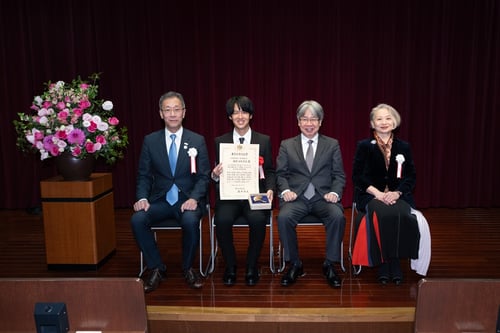Shingo Kaneta-Takada, Department of Electrical Engineering and Information Systems, received the AY2023 President's Award
On 19th March 2024, the award ceremony for the AY2023 University of Tokyo President's Award was held in Yasuda Auditorium. This year, Shingo Kaneta-Takada, Department of Electrical Engineering and Information Systems, was selected for the Academic Achievement award and received a certificate of commendation from President Fujii.
The awarded research is "Spin-charge current conversion and magnetotransport phenomena in all-epitaxial spin-orbit ferromagnetic oxide heterostructures". The University of Tokyo President's Award is presented by the President of the University of Tokyo to an individual or organization that has made particularly outstanding achievements in academics, extracurricular activities, and social activities as a student of the University, and has served as a role model for other students and enhanced the University's reputation.
President's Award (Academic)
Shingo Kaneta-Takada, Department of Electrical Engineering and Information Systems

About awarded research
Title: Spin-charge current conversion and magnetotransport phenomena in all-epitaxial spin-orbit ferromagnetic oxide heterostructures
In today's information society, the rapid increase in the amount of information has led to a continuous increase in the power consumption of information processing devices and memory. As a result, spintronics, which utilizes the spin of electrons (the property of electrons as magnets), is being actively pursued. In general, spintronic devices use the orientation of magnetization (NS direction) in ferromagnetic materials (magnets) to record information as "0" and "1", allowing information to be retained without power supply and greatly reducing power consumption. Recently, devices have been developed that focus on the interconversion phenomenon between a spin current, the flow of electron spins, and an electric current, the flow of electron charges. It is believed that the higher efficiency of this "spin-charge current interconversion" leads to lower power consumption for device operation. In this study, we have successfully achieved the most efficient spin-charge current conversion using a two-dimensional electron gas formed at the LaTiO3+δ/SrTiO3 interface. Furthermore, through theoretical calculations, we have provided guidelines for material design to achieve high conversion efficiency. In addition, we have explored ferromagnetic materials and novel physical phenomena for the realization of ultra-low power memory.
Your impression & future plan
I am honored to receive the President's Award from the University of Tokyo. This prestigious award was made possible by the continuous support and collaboration of my supervisor, Professor Shinobu Ohya, my co-researcher, Professor Masaaki Tanaka, and many others. I express my sincere gratitude to all of them. Inspired by this award, I commit to further dedicating myself to my research, with the aim of contributing benefits back to society.
You May Also Like
These Related Stories
Kota Morinishi, a first-year student in doctoral course of the department of architecture, wins President's Award for Students AY2013

Lecturer Kaori Sugihara received The 4th Award for a Brilliant Female Researcher (The JST President Award)


